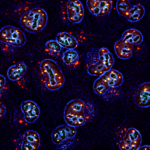Lien vers Pubmed [PMID] – 32937131
Lien DOI – 10.1016/j.celrep.2020.108146
Cell Rep 2020 Sep; 32(11): 108146
Post-translational modification by SUMO is a key regulator of cell identity. In mouse embryonic fibroblasts (MEFs), SUMO impedes reprogramming to pluripotency, while in embryonic stem cells (ESCs), it represses the emergence of totipotent-like cells, suggesting that SUMO targets distinct substrates to preserve somatic and pluripotent states. Using MS-based proteomics, we show that the composition of endogenous SUMOylomes differs dramatically between MEFs and ESCs. In MEFs, SUMO2/3 targets proteins associated with canonical SUMO functions, such as splicing, and transcriptional regulators driving somatic enhancer selection. In contrast, in ESCs, SUMO2/3 primarily modifies highly interconnected repressive chromatin complexes, thereby preventing chromatin opening and transitioning to totipotent-like states. We also characterize several SUMO-modified pluripotency factors and show that SUMOylation of Dppa2 and Dppa4 impedes the conversion to 2-cell-embryo-like states. Altogether, we propose that rewiring the repertoire of SUMO target networks is a major driver of cell fate decision during embryonic development.





